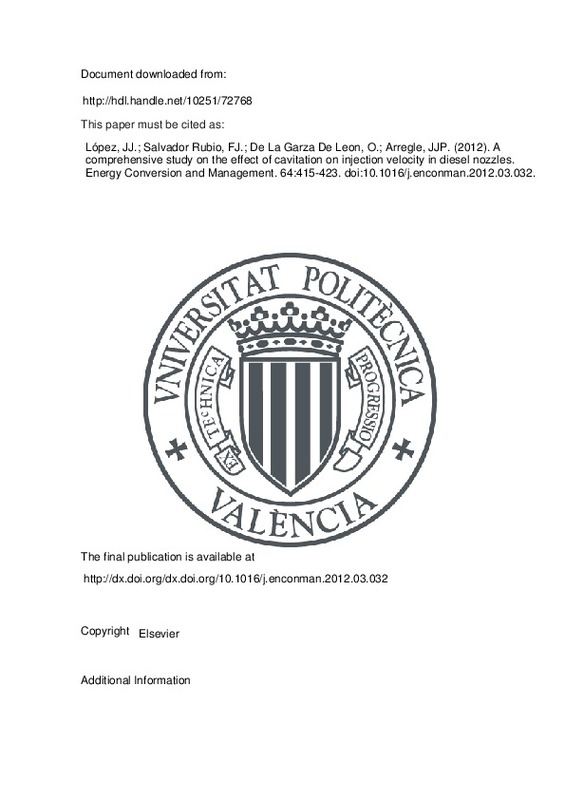López, JJ.; Salvador Rubio, FJ.; De La Garza De Leon, O.; Arregle, JJP. (2012). A comprehensive study on the effect of cavitation on injection velocity in diesel nozzles. Energy Conversion and Management. 64:415-423. https://doi.org/10.1016/j.enconman.2012.03.032
Por favor, use este identificador para citar o enlazar este ítem: http://hdl.handle.net/10251/72768
|
Título:
|
A comprehensive study on the effect of cavitation on injection velocity in diesel nozzles
|
|
Autor:
|

 López, J. Javier
López, J. Javier

 Salvador Rubio, Francisco Javier
De La Garza De Leon, Oscar
Salvador Rubio, Francisco Javier
De La Garza De Leon, Oscar
 Arregle, Jean Joseph Pierre
Arregle, Jean Joseph Pierre
|
|
Entidad UPV:
|
Universitat Politècnica de València. Escuela Técnica Superior de Ingenieros Industriales - Escola Tècnica Superior d'Enginyers Industrials
Universitat Politècnica de València. Escuela Técnica Superior de Ingeniería del Diseño - Escola Tècnica Superior d'Enginyeria del Disseny
|
|
Fecha difusión:
|
|
|
Resumen:
|
Results when testing cavitating injection nozzles show a strong reduction in mass flow rate when cavitation appears (the flow is choked), while the momentum flux is reduced to a lesser extent, resulting in an increase in ...[+]
Results when testing cavitating injection nozzles show a strong reduction in mass flow rate when cavitation appears (the flow is choked), while the momentum flux is reduced to a lesser extent, resulting in an increase in effective injection velocity. So as to better understand the origin of this increase in effective injection velocity, the basic equations for mass and momentum conservation were applied to an injection nozzle in simplified conditions. The study demonstrated that the increase in injection velocity provoked by cavitation is not a direct effect of the latter, but an indirect effect. In fact, the vapor appearance inside the injection hole produces a decrease in the viscosity of the fluid near the wall. This leads to lower momentum flux losses and to a change in the velocity profile, transforming it into a more "top hat" profile type. This change in the profile shape allows explaining why the momentum flux reduction is not so important compared to that of the mass flow rate, thus explaining why the effective injection velocity increases. © 2012 Elsevier Ltd. All rights reserved.
[-]
|
|
Palabras clave:
|
Injection velocity
,
Nozzle cavitation
,
Velocity profile
,
Basic equations
,
Comprehensive studies
,
Indirect effects
,
Injection holes
,
Injection nozzles
,
Mass flow rate
,
Momentum conservations
,
Momentum flux
,
Profile shapes
,
Top hat
,
Velocity profiles
,
Cavitation
,
Momentum
,
Nozzles
,
Pipe flow
,
Vapors
,
Velocity
|
|
Derechos de uso:
|
Reserva de todos los derechos
|
|
Fuente:
|
Energy Conversion and Management. (issn:
0196-8904
)
|
|
DOI:
|
10.1016/j.enconman.2012.03.032
|
|
Editorial:
|
Elsevier
|
|
Versión del editor:
|
http://dx.doi.org/dx.doi.org/10.1016/j.enconman.2012.03.032
|
|
Código del Proyecto:
|
info:eu-repo/grantAgreement/MICINN//AP2008-01913/ES/AP2008-01913/
|
|
Agradecimientos:
|
The authors thank different members of the CMT-Motores Termicos team of the Universitat Politecnica de Valencia for their contribution to this work: to Jaime Gimeno, for his fruitful comments, and to Xandra Margot, Stavroula ...[+]
The authors thank different members of the CMT-Motores Termicos team of the Universitat Politecnica de Valencia for their contribution to this work: to Jaime Gimeno, for his fruitful comments, and to Xandra Margot, Stavroula Patouna and Gabriela Bra-cho for their help in the CFD calculations. Also they thank the FPU program of the Ministerio de Educacion of Spain for granting the Ph.D. studies of Oscar A. de la Garza (grant AP2008-01913). Open-FOAM and Star-CD are registered trademarks of OpenCFD Ltd. and CD-Adapco, respectively.
[-]
|
|
Tipo:
|
Artículo
|







![[Cerrado]](/themes/UPV/images/candado.png)


